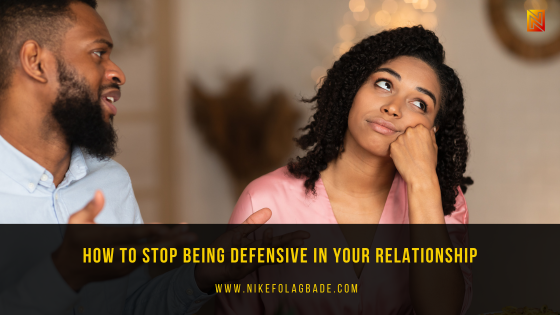Defensiveness is a common posture that people adopt in relationships when communicating, and it can sometimes lead to a sudden breakdown in the direction of conversations. People generally appreciate it when you take responsibility for your mistakes, as such, it becomes problematic if your partner feels you are always being defensive.
Being defensive involves consistently reacting to corrections or offering unnecessary explanations when your actions offend your partner. It can also serve as a means to evade taking responsibility regarding an issue.
Defensiveness can manifest as both an emotional state and an observable behaviour. You may get defensive when you feel overpowered by shame or anger in response to someone’s criticism and attack. Consequently, you may respond with malice or become excessively critical in return.
While being defensive might provide temporary relief, at the end of the back-and-forth blame game, the whole conversation may become bitter to chew, which may end up undermining your self-esteem. In certain cases, men are usually quick to notice this pattern in their women, often perceiving it as disrespect or a lack of submission within a marriage relationship.
People who frequently exhibit defensiveness often have a history of emotional trauma, rejection, criticism, or abuse during their young age.
Here are some signs that indicate you may be defensive:
● Refusing to take responsibility for your actions.
● Choosing to argue instead of offering an apology.
● Passing the blame onto your partner instead of being accountable.
● Resorting to hurtful statements as a means to evade the real truth.
● Bringing up past issues your partner faced to divert attention from the main facts.
● Using silent treatment to shut out your partner.
Consistently adopting a defensive stance can have the following detrimental impacts on both yourself and your relationship:
● Your attitude may not align with your true intentions, causing others to perceive you in a negative light. Instead of humbly admitting your weakness and addressing the underlying issues, your defensiveness would project an image of unwillingness to take responsibility.
● You create a more hostile environment during conversations. This, in turn, makes your partner uninterested to continue the discussion.
● The problems at hand will shift from the main issue to your character. As a result, you end up offering apologies without genuinely addressing or rectifying the core issues.
● It can introduce an atmosphere of tension, misunderstanding, and unresolved conflicts in your relationship. This can erode the overall positivity and emotional well-being of both partners.
● Your partner may begin to harbour feelings of resentment towards you. Over time, this will impact the emotional connection between you, leading to a strain on the relationship and potentially distancing you from each other.
So how can you stop being defensive? Here are a few things to do:
Build Self-Awareness: You need to recognise when you are becoming defensive because it’s easy to evade your actions or admit that you are reacting defensively. Pay close attention to your emotional state and the thoughts that run through your mind when you encounter such situations.
When you cultivate self-awareness, you will be able to establish self-control mechanisms along the way. While you may not be able to express how you feel in the heat of the moment, acknowledge your emotions within your heart, and understand how you feel. However, make a conscious decision not to let those emotions dictate your behaviour. Instead, channel the energy into a more positive mindset.
Confront the issue before you confront the emotions: It is important to attend to your partner\’s feedback or request. If your partner accuses you wrongly, you must respond with compassion and appreciation for their words. Begin by expressing your apology if there was any misunderstanding, reassuring them of the truth. Apologising first can help calm the nerves of your partner.
When communicating, rely on facts and appeal to the logical side of your partner before shifting to the emotional part of how you feel, particularly when dealing with a man.
When expressing your emotions, take responsibility for them and share them openly to foster a sense of emotional relief. For instance, you can say, “I am sorry for my actions. I didn’t mean to ignore you during the virtual meeting. I was focused on other aspects of my work and got distracted.”
Once your partner acknowledges your perspective, you can then express your feelings of remorse, stating, “But I also feel bad about my behaviour, and I felt embarrassed when you accused me. I will take your feedback seriously and work on improving.”
It\’s important to strike a balance between your emotions and logical reasoning during these discussions. By avoiding excessive emotional reactions, you can prevent every feedback or argument from turning into a need to win or seek pacification. When you find this equilibrium, it will foster a healthier and more productive dialogue in your relationship.
Build your self-esteem: Instead of seeking reassurance from your partner, allow them to focus more on your apology. Remember that everyone makes mistakes and that you are not perfect. Resist the urge to indulge in self-persecution afterwards.
We all make mistakes, hence offer grace to yourself and reflect on your emotions by journaling. Your partner can address your feelings once they are in a better state, so avoid disrupting the present moment.
Speak to a professional: If you are battling defensiveness in your marriage relationship or social interactions, it may be beneficial to consult a therapist who can troubleshoot the root causes by delving into your upbringing and experiences.
Therapy can help you understand and address the foundational reasons behind your behaviours. Book a session here to discuss these: www.nikefolagbade.com/coachingpackage
When you begin to give more listening ears, display vulnerability, take responsibility, and embrace humility in your relationship, you would notice a positive shift in the dynamics of your relationship.
Cheers to a better YOU.

